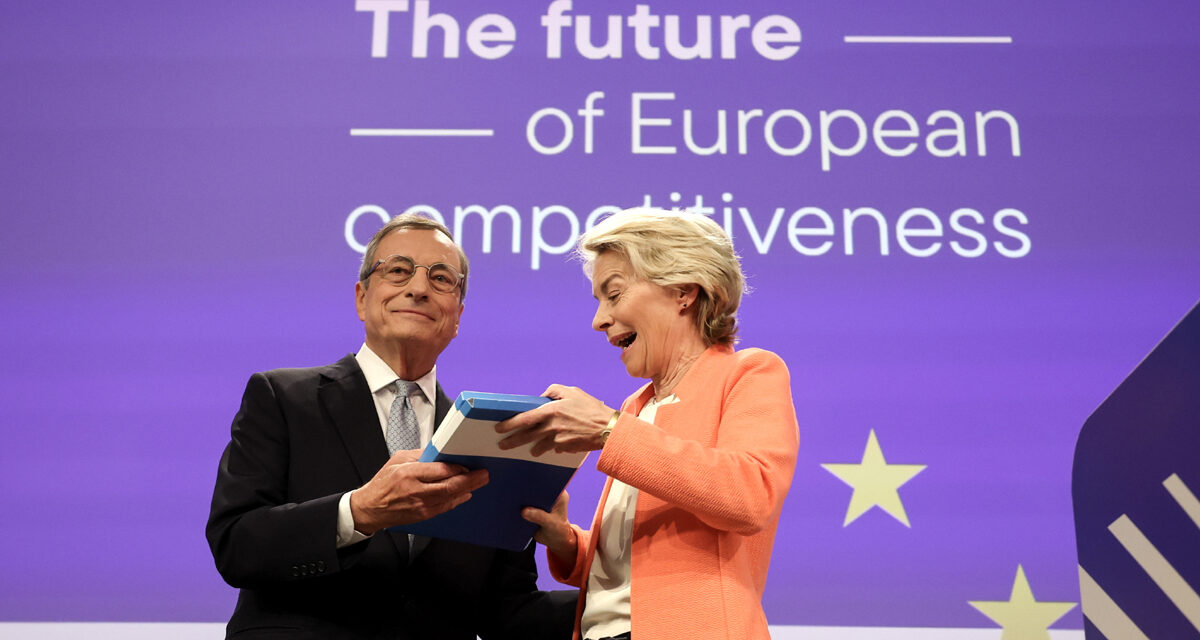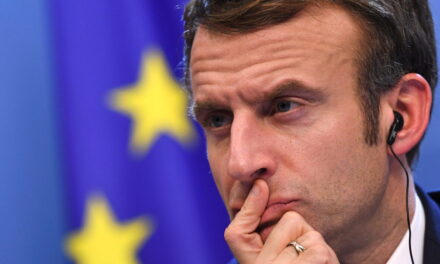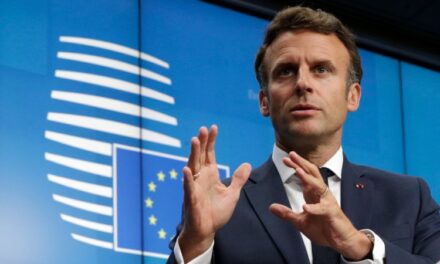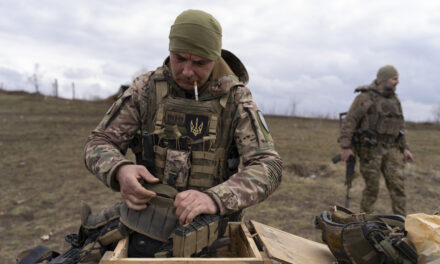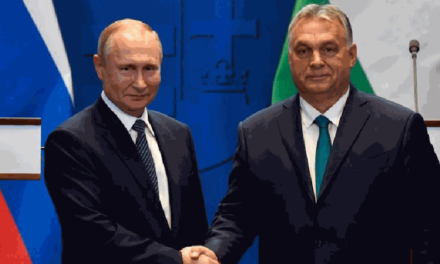Mario Draghi - the financial magician also referred to as Super Mario - roughly proclaims the principle of "EU arms in the hands of the EU", but the implementation of the idea is more than problematic.
Draghi, the former president of the European Central Bank, discusses in his report over more than 300 pages why the EU's competitiveness fell into the basement, and what could be done to get it close to the fast elevator again. In Mario Draghi's draft, requested by Ursula von der Leyen, he devoted a separate chapter to the European defense industry and the rather sensitive topic of arms purchases by member states.
The financial wizard, also known as Super Mario, begins his proposal with some depressing data: the United States benefits from the majority of the EU's defense spending. As a result of the war in Ukraine, the member states began to arm themselves frantically,
however, of the €73 billion spent on defense procurement between June 2022 and June 2023, 78 percent went to foreign companies—and 63 percent went to a single location, the United States.
Draghi also admits the simple fact that the primary reason for this is rooted in the lack of capacity and supplies of the European military industry, but he immediately adds that in the case of weapons where the EU industry does not struggle with deficiencies, it is not appropriate to launch foreign procurement projects.
The former head of the ECB strongly lamented that although the European military industry is capable of producing high-tech weapons (Eurofighter Typhoon, Leopard 2 A7 tank), most countries, including the Netherlands, Germany, Poland, Romania, Belgium and Denmark, procure them from outside the bloc. - in the case of fighter jets, the pursuit of the American F-35s began, while the South Korean military industry made a huge splash with ground military technology: Poland alone signed a contract with Seoul worth more than 10 billion dollars for tanks, self-propelled guns and rocket launchers.
Draghi's proposed solution is not new, but it will again be unfeasible: he is talking about financial incentives from EU sources to encourage governments to make European purchases, that is, he is once again proposing a budget fattened up by the member states, from which the subsidies are then repaid.
At the same time, it also calls on the member states to show more enthusiasm in the field of joint spending and joint arms procurement, eliminating the fragmentation of the European defense market. It also recommends that the EU begin to increase the size and capacity of arms companies and open the doors of financing more to the defense industry, allowing, for example, the European Investment Bank - whose statutes state that it does not lend to the arms industry - its lending policy should change.
Draghi's utopian ideas are bleeding from several wounds
Not only about the well-known lack of capacity in the military industry (we can remember the EU's miserably failed attempt, in which it promised Ukraine one million rounds of ammunition in one year, until it finally realized that it had no chance of fulfilling it), the lack of long-term contracts between governments and arms manufacturers, or the absence of skilled labor it's about The idea of joint purchases, joint capacity increase and joint forms of financing fails at the threshold because of one fundamental thing:
all of this would require common defense and security policy thinking, but this is not present at all among the member states.
The problem is exacerbated by the fact that Draghi also envisions all of this with centralized control from Brussels: this, however, will be rigidly rejected by almost all member states. Defense economic independence follows from the exclusive national sovereignty of the armed forces, and no one wants to undermine this simply so that a Brussels committee can decide where its weapons and soldiers are most needed.
The first problem is the biggest
After Draghi proposes spending 800 billion euros a year with the help of joint borrowing (or additional taxation of the member states) in order to restore EU competitiveness, subsidies aimed at increasing the capacity of the defense industry and the co-financing of joint arms purchases from this non-existent (and the German negative already arrived at the joint loan) would like to cover it from an amount that will never be realized due to the answer. To be clarified:
precisely because of the rejection of the member states that play according to the strict fiscal rules, this borrowing will never be realized, that is, the fruit of Draghi's one-year proposal-nailing work will wither on the tree right from the start.
However, if we were to ignore this fact and assume that the billions of stimulus money would actually be available, there would be no coordinated and common progress in the field of defense.
The European Union is clearly in a state of confusion when it tries to position its geopolitical power in a world order that is completely transforming and losing its balance. The assessment and management of the war in Ukraine and the conflict in Israel, China and the Global South's efforts to establish a multipolar order, and the increasingly wild protectionist efforts of the United States in order to preserve its hegemony, generate fault lines between the member states rather than unity.
The lack of consensus on foreign policy naturally also affects defense policy. The idea of centralization in Brussels is getting stronger, but also more distant:
no centralized body would be able to manage the completely different defense policies of the member states, and therefore would not be able to define priorities.
The threat means something completely different in Italy or Portugal than in Poland or Estonia - and this legally assumes the diversity of the defense industry and procurement, as well as the ineffectiveness of a centralized funding system. Moreover, since it makes it impossible to develop a common defense policy, it also makes it impossible for the European Union to become a globally dominant force in terms of defense. The unanimous stance against Russia and the (not so unanimous) keeping Ukraine on a ventilator is undoubtedly progress, but the panic that broke out following the news about the slowing down of American involvement also indicates that the EU is far from ready to maintain it continuously. In order for this to happen, it would be necessary to corral countries with different security policy principles and to build a centralized defense system - there is not even a shred of chance for either, no matter how much the European Commission wants to take the initiative into its own hands.
Accordingly, defense procurement remains - correctly and thoughtfully - under national control. Every country buys what and how it wants - if we think about the effectiveness of intimidation from Russia, it cannot do otherwise. For several more years, the focus will be on acquiring weapon systems as quickly as possible, so Draghi's criticism regarding foreign purchases is not only unnecessary, but downright meaningless.
The already mentioned 1 million artillery munitions donation to Ukraine really got stuck when Macron was not willing to go into filling the European capacity shortage abroad. He already came with what Draghi is now saying: European arms purchases must be made with European (if possible, French) manufacturers. It took several weeks for him to realize that he had made impossible demands and grit his teeth to agree to the foreign purchase.
And it is hard to even imagine that instead of flexible national procurements, a Brussels machine rusted by bureaucracy controls the arms purchases, simply so that only European weapons are on the menu.
The centralization and unification of the protection area is a completely unrealistic idea. For that, the European Union and primarily the current, increasingly political and pyramid-like exercise of power in Brussels would have to be fundamentally restructured - the chances of which are zero. Behind Draghi's thoughts is the idea of European defense independence, but his theses will remain in the category of simple ideas for a very long time. The European Commission, which commissioned the study, can also feel this, and since the presentation of the report, together with Draghi, it has been practically silent.
Featured Image: Former European Central Bank President Mario Draghi (b) and European Commission President Ursula von der Leyen present the European Competitiveness Report in Brussels on September 9, 2024.
MTI/EPA/Olivier Hoslet

